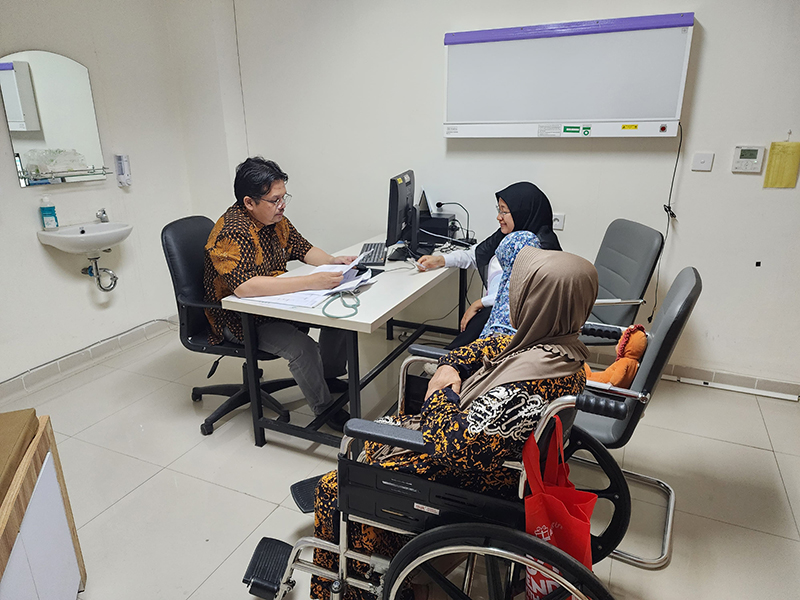Delivering high-quality cancer care in Indonesia is deeply challenging. As the world’s fourth-most populous country and largest archipelago, Indonesia has more than 6,000 inhabited islands. This geography complicates nearly every aspect of health care, from early detection to timely referrals – especially for people living outside major cities.
Lung cancer, Indonesia’s leading cause of cancer-related death*, is particularly difficult to manage. Many patients are diagnosed in later stages, when treatment options are limited and outcomes are worse. In rural and provincial hospitals, many providers work in isolation and have limited access to specialized diagnostics and therapies.
A Lifeline for Remote Providers
Project ECHO connects doctors in regional hospitals with national experts to share knowledge and improve clinical care. Using the ECHO Model, providers present real cases and learn from peers without leaving their communities.
For Dr. Liyah Giovana, a pulmonologist in the Bangka Belitung Islands, Project ECHO has become a vital part of her work. As the only lung specialist at her hospital, Dr. Giovana serves a geographically isolated population and often handles complex cases without support.

Bangka Belitung Islands, Indonesia: Dr. Liyah Giovana serves as the only pulmonologist at her regional hospital in this remote island province. Photo credit: Adobe Stock
“Project ECHO has been very beneficial for me,” she says. “It refreshes our medical training and includes case sharing from various hospitals.”
In one case, Dr. Giovana was treating a patient with small-cell lung carcinoma; coincidentally, experts addressed this exact diagnosis during the following ECHO session.
“It really helped me determine the best therapy,” she says. “The timing was perfect, and the information was directly applicable.”
During a different ECHO session, Dr. Giovana learned about malignant pleural effusion—fluid build-up between the lung and chest wall related to cancer—which helped her manage symptoms for another patient. In both cases, ECHO delivered expert guidance exactly when it was needed.
Building Networks, Strengthening Systems
“Before ECHO, communication with referring hospitals in our network was limited,” says Dr. Rouly Pola Pasaribu, an internist pulmonologist and critical care medicine consultant, who leads the lung cancer ECHO program at Dr. Mohammad Hoesin Hospital in Palembang, South Sumatra’s top public referral hospital. They partnered with ECHO to better support smaller hospitals in surrounding provinces.

Dr. Rouly Pasaribu consults with a patient and their family at Dr. Mohammad Hoesin Hospital, where he leads Project ECHO sessions to support providers across South Sumatra. Photo credit: ECHO RSUP Dr. Mohammad Hoesin Palembang team, July 2025
“ECHO improved that communication, allowing case sharing to help us identify and address local challenges more effectively,” says Dr. Pasaribu.
Inside the hospital walls, ECHO is helping break down silos: oncologists, pulmonologists, radiologists and thoracic surgeons now work collaboratively during ECHO sessions. This multidisciplinary approach helps ensure more consistent, coordinated care.
For example, during an ECHO session, Dr. Pasaribu learned that radiotherapy could ease bone pain caused by lung cancer metastases.
“That insight changed how we approached palliative care,” he says. “Even if we couldn’t cure the cancer, we could still improve the patient’s quality of life.”
“Internally, ECHO has helped us work together as a team,” Dr. Pasaribu says. “And externally, smaller hospitals can now adopt our management approaches and treat patients locally.”
Closing Gaps, One Conversation at a Time
Challenges persist, particularly in early detection. Many rural providers still lack access to key diagnostic tools: blood tests that assess immune strength, fungal infection screens, or CT scans. By highlighting these needs and encouraging collaboration, ECHO drives progress in underserved areas.
“ECHO is very important because it allows providers in remote areas to share challenging cases and receive input,” adds Dr. Giovana. “I don’t have access to certain tests, so expert guidance is critical.”
Across Indonesia, lung cancer outcomes are improving. What began as a knowledge-sharing platform has grown into a network of mutual support, helping providers and improving outcomes for patients.
To learn more about how Indonesia’s ECHO programs are addressing lung cancer and expanding access to care, email the program team.
Featured image: Dr. Rouly Pola Pasaribu, an internist pulmonologist and critical care medicine consultant, who leads the lung cancer ECHO program at Dr. Mohammad Hoesin Hospital in Palembang, Indonesia. Photo provided by ECHO RSUP Dr. Mohammad Hoesin Palembang Team, July 2025
*ISR Consensus Statement on Lung Cancer Screening in Indonesia (2023), Jurnal Respirologi Indonesia.


